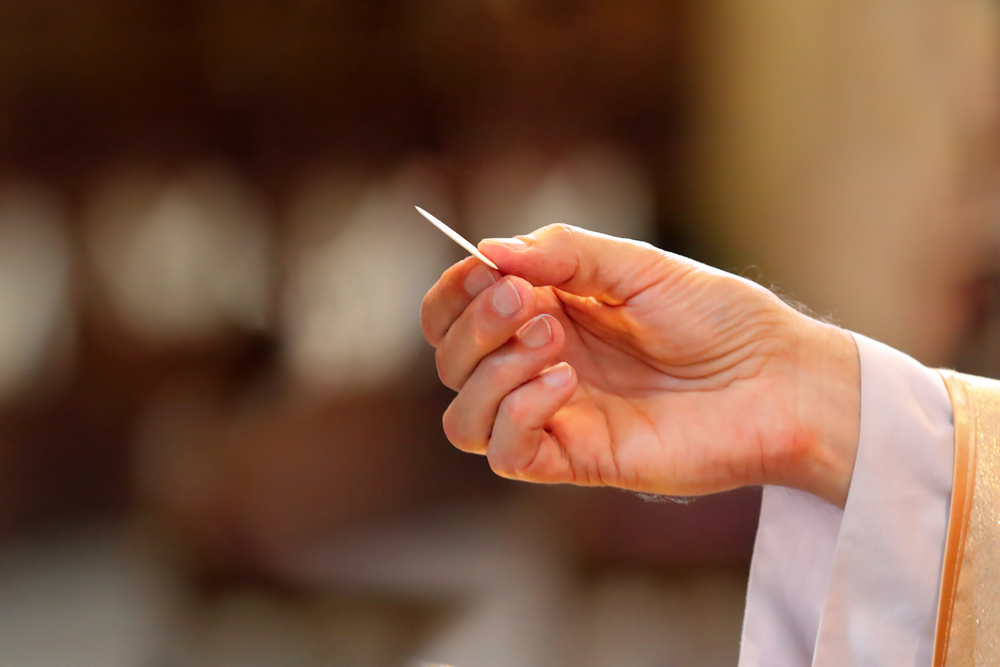precept [pree-sept] : a commandment or direction given as a rule of action or conduct
Did you know that there are five precepts of the Catholic Church? They’re outlined in the Catechism of the Catholic Church, paragraphs 2041-2043. Most actively practicing Catholics far surpass them and therefore give them no thought. These precepts are a “very necessary minimum in the spirit of prayer and moral effort, in the growth in love of God and neighbor” (CC 2041). In other words, if you want to be considered a practicing Catholic, these minimum requirements must be met.
First Precept – “You shall attend Mass on Sundays and on holy days of obligation and rest from servile labor.” This requires that the faithful keep holy the Lord’s Day and not let work or chores get in the way of sanctifying these days.
Second Precept – “You shall confess your sins at least once a year.” This helps you to be prepared for the reception of the Holy Eucharist and keep your soul in a state of grace. Of course, more frequent confession is always encouraged; once a month would be excellent!
 Third Precept – “You shall receive the sacrament of the Eucharist at least during the Easter season.” While you must attend Mass every Sunday and on holy days of obligation, you are not required to receive the Eucharist. The Church places as a minimum that the faithful receive Our Lord’s Body and Blood (while in a state of grace) during the Easter season, which the Catechism calls “the origin and center of the Christian liturgy” (CC 2042).
Third Precept – “You shall receive the sacrament of the Eucharist at least during the Easter season.” While you must attend Mass every Sunday and on holy days of obligation, you are not required to receive the Eucharist. The Church places as a minimum that the faithful receive Our Lord’s Body and Blood (while in a state of grace) during the Easter season, which the Catechism calls “the origin and center of the Christian liturgy” (CC 2042).
Fourth Precept – “You shall observe the days of fasting and abstinence established by the Church.” This penance prepares us for liturgical feasts and “helps acquire self-mastery over our instincts” (CC 2043). If you need a refresher on these fasting and abstinence obligations, read this. The universal Church designates all Fridays as days of abstinence from meat, but in the United States, this is only obligatory on Fridays during Lent.
Fifth Precept – “You shall help to provide for the needs of the Church.” The faithful are required to support the Church with financial and material contributions according to their own ability. This will look different for each family, but the idea is to be generous.
Keep in mind that these precepts are “set in the context of a moral life bound to and nourished by liturgical life.” Following these five guidelines doesn’t mean that you don’t have to follow the 10 Commandments or can neglect the rest of the sacraments and other teachings of the Church—far from it.
They are required unless there is a legitimate reason for not meeting them. For example, if you are gravely ill and cannot attend Mass or you are pregnant and cannot fast on Ash Wednesday. If you have specific questions about your situation, consult a priest or spiritual director for advice.
Of course, God desires not our minimum, but our whole self. It might be sufficient to scrape by with a barely passing grade on an exam, but in the spiritual life, we must aim much higher. When the end goal is heaven, who wants to prepare with simply the bare minimum? Out of our love for God, we go above and beyond and do our best to grow spiritually and love God and our neighbor to the best of


